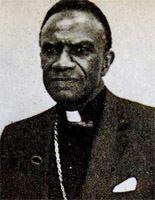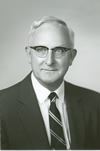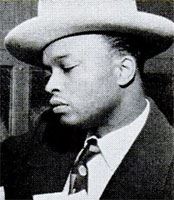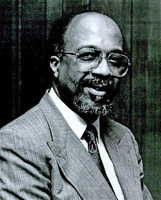Religious Leaders of the Boston-Edison Historic District
Rabbi Morris Adler
 Morris Adler, the son of a Rabbi, was born in Russia in 1908 and came to the United States as a boy in 1913. He served in Buffalo and then in 1938, accepted the pulpit of Shaare Zedek in Detroit. Except for a stint in the US Army in WWII, Adler stayed with Shaare Zedek for the rest of his life. During his tenure, the congregation grew to one of the largest in the world.
Morris Adler, the son of a Rabbi, was born in Russia in 1908 and came to the United States as a boy in 1913. He served in Buffalo and then in 1938, accepted the pulpit of Shaare Zedek in Detroit. Except for a stint in the US Army in WWII, Adler stayed with Shaare Zedek for the rest of his life. During his tenure, the congregation grew to one of the largest in the world.
Adler was a good friend of Walter Reuther, and a chairman of the Public Review Board of the United Auto Workers. In addition, he was active in the civil rights movement, and served on the Michigan Fair Elections Practices Commission, the Governor’s Board of Higher Education, the Detroit Round Table of Christians and Jews.
In 1966, Adler was shot during Sabbath service in his synagogue by a mentally ill youth; he died 27 days later.
Morris Adler lived at 2062 Edison in the 1950s.
Rev. Dr. A. A. Banks, Jr.
 Allan A. Banks, Jr. was born in Bryan, Texas. His family moved to Idaho, where he attended school, but Banks returned to Texas to attend Bishop College, where he received a B.A. He went on to receive an MA and a BD from Howard University. He was ordained and served as the Assistant Pastor at Shiloh Baptist Church in Washington DC. In 1943, he applied for an Associate Pastor position at Detroit's historic Second Baptist Church, and served in that capacity until 1946.
Allan A. Banks, Jr. was born in Bryan, Texas. His family moved to Idaho, where he attended school, but Banks returned to Texas to attend Bishop College, where he received a B.A. He went on to receive an MA and a BD from Howard University. He was ordained and served as the Assistant Pastor at Shiloh Baptist Church in Washington DC. In 1943, he applied for an Associate Pastor position at Detroit's historic Second Baptist Church, and served in that capacity until 1946.
In 1947, the church's previous pastor died, and Banks was appointed to serve as Second Baptist's pastor. He was devoted to the civil rights struggle, and in 1964 was appointed as one of the original members of the Michigan Civil Rights Commission. He also served as president of the Metropolitan Detroit Council of Churches and as a board member of the National Council of Churches. He continued as pastor at the Second Baptist Church, and as a Civil Rights Commissioner, until his death in 1977.
Rev. A. A. Banks lived at 2340 Chicago from the early 1960s until his death.
Rev. Robert L. Bradby Jr.
Robert L. Bradby Jr. was born in Detroit in 1913. His father was Robert L. Bradby Sr., longtime pastor of the Second Baptist Church. The younger Bradby grew up in Detroit, and graduated from both the Detroit Institute of Technology and the Great Lakes School of Divinity. In 1943 he became the pastor the the Greater King Solomon Baptist Church, a position he held the rest of his life. He was president of the Detroit NAACP from 1947 to 1950, and served on the Detroit Housing Commission (from which he was removed in 1950 by Albert Cobo for opposing segregationist policies).
Rev. Robert L. Banks lived at 2060 Longfellow from the early 1950s until his death in 1962.
Rev. Henry Hitt Crane
Henry Hitt Crane was born in 1890 in Illinois, and completed his theological education in Boston in 1916. He served as a chaplain in WWI, an experience which prompted him to become a pacifist. He had a reputation as an excellent public speaker, and served in a number of large Methodist churches. In 1938, Crane came to Detroit to become minister of the Central Methodist Church, a position which he held for twenty years. In addition to his pacifism, Crane was a leading supporter of racial equality, civil liberties, and workers' rights. Crane retired in 1958, and died in 1977.
Henry Hitt Crane lived at 671 Edison from the late 1940s though the 1970s.
Read a dissertation on Rev. Henry Hitt Crane.
Rabbi Leo M. Franklin

Leo M. Franklin was born in 1870 and ordained in 1892 by the Hebrew Union College in Cincinnati. He served as rabbi of Congregation Temple Israel from 1892-1899, where he gained a reputation as an eloquent and idealistic preacher. In 1899, he began his career as Rabbi of Temple Beth El, a post he held until 1941. Temple Beth El was Michigan's first Jewish congregation, founded in 1850, and Franklin was the eleventh rabbi to serve. Franklin, however, set out to revitalize Judaism in his congregation. He is credited with inspiring congregational participation and turning the small Temple into a thriving organization. He organized the children's choir, the children's Sabbath morning service, Bible classes for young people, a Women's Auxiliary, a Young People's Society, and the publication of a regular Temple Bulletin.
Rabbi Franklin's activities were not confined to the pulpit. He was the Jewish Ambassador to the community. He oversaw the organization of United Jewish Charities, Detroit's first umbrella philanthropic group. His philosophy was a reflection of the classic goals of classical Reform Judaism: to integrate Jews into the American Community, so that they might be considered as Americans who believe in and practice the Jewish Faith. He was a good friend of his neighbor Henry Ford, who earlier in life had been anti-Semitic, and greatly influenced Ford's thinking.
Rabbi Leo M. Franklin lived at 26 Edison from the early 1910s until his death in 1948.
Bishop William A. Hilliard
 William Hilliard was born in 1904 in Greenville, Texas. His family moved to Kansas City, and Hilliard received his BA from Western University in Kansas, and his BD from Shaeffer Theological Seminary in 1927. He married Edna Mae Estrelle later that year, and was also ordained as a deacon of the African Methodist Episcopal Zion church. He served as pastor of two AMEZ churches in Kansas and one in South Carolina before moving on the the St. Paul AMEZ Church in Detroit in 1947.
William Hilliard was born in 1904 in Greenville, Texas. His family moved to Kansas City, and Hilliard received his BA from Western University in Kansas, and his BD from Shaeffer Theological Seminary in 1927. He married Edna Mae Estrelle later that year, and was also ordained as a deacon of the African Methodist Episcopal Zion church. He served as pastor of two AMEZ churches in Kansas and one in South Carolina before moving on the the St. Paul AMEZ Church in Detroit in 1947.
Hilliard was elected the 67th bishop of the AMEZ in 1960. He served in multiple episcopal districts, and was president of the Board of Bishops in 1977-78. He retired in 1980.
William Alexander Hilliard lived at 690 Chicago from the early 1950s through the 1970s.
Rev. Benjamin F. Holme
 Benjamin Franklin Holme was born in 1894 at Camden, New Jersey. He graduated from Wesleyan University and served in World War I, first in the Bellevue Hospital in New York City, and later overseas in France. He married Verna Mae Dall in 1920, and attended Northwestern University where he received his B.D. and M.A. degrees. In 1923, he was ordained a Deacon, then an Elder, in the United Methodist Church.
Benjamin Franklin Holme was born in 1894 at Camden, New Jersey. He graduated from Wesleyan University and served in World War I, first in the Bellevue Hospital in New York City, and later overseas in France. He married Verna Mae Dall in 1920, and attended Northwestern University where he received his B.D. and M.A. degrees. In 1923, he was ordained a Deacon, then an Elder, in the United Methodist Church.
From 1925 to 1930, Holme served as Associate Pastor of the Detroit Central Methodist Church. He left for Monroe, then returned to Detroit in 1936 to serve at Detroit Westlawn. In 1952, he was named the Superintendent of the Detroit District, and in 1958 the Executive Secretary of the Methodist Union of Greater Detroit, where he served until 1965. Verna Holme died in 1985, and Benjamin Holme followed her in 1989 at the age of 95.
Dr. Benjamin Franklin Holme and his wife Verna lived at 703 Edison from the early 1950s through the 1970s.
Samuel N. Hancock
 Samuel Hancock was born in 1883 in Kentucky, and moved with his family to Indianapolis in the 1890s. He was married in 1907, and in 1914 joined the Pentecostal movement under the ministry of Garfield Thomas Haywood. He served as Haywood's assistant pastor in Indianapolis until 1921, when he assumed the pastorate of a church in Detroit, the Bethlehem Temple. In 1957, Hancock founded the Pentecostal Churches of the Apostolic Faith International, Inc. Hancock was the presiding bishop until his death in 1963.
Samuel Hancock was born in 1883 in Kentucky, and moved with his family to Indianapolis in the 1890s. He was married in 1907, and in 1914 joined the Pentecostal movement under the ministry of Garfield Thomas Haywood. He served as Haywood's assistant pastor in Indianapolis until 1921, when he assumed the pastorate of a church in Detroit, the Bethlehem Temple. In 1957, Hancock founded the Pentecostal Churches of the Apostolic Faith International, Inc. Hancock was the presiding bishop until his death in 1963.
Samuel N. Hancock lived at 2235 Longfellow (in the house built for David H. Crowley) from the early 1950s until his death in 1963.
Philbert X. Little
 Philbert Little was born in 1923 in Omaha, Nebraska. In 1929 his family moved to Lansing. Along with his brothers Wilfred and Malcolm (later Malcolm X), Philbert became involved with Elijah Muhammad and the Nation of Islam. Philbert Little later changed his name to Abdul Aziz Omar, and organized temples through the state of Michigan, including founding the Number 1 in Detroit. His formal ministry ended in about 1980, but he is credited with reigniting interest in his brother Malcolm later. He died in 1994.
Philbert Little was born in 1923 in Omaha, Nebraska. In 1929 his family moved to Lansing. Along with his brothers Wilfred and Malcolm (later Malcolm X), Philbert became involved with Elijah Muhammad and the Nation of Islam. Philbert Little later changed his name to Abdul Aziz Omar, and organized temples through the state of Michigan, including founding the Number 1 in Detroit. His formal ministry ended in about 1980, but he is credited with reigniting interest in his brother Malcolm later. He died in 1994.
Abdul Aziz Omar (Philbert X. Little) lived at 2081 Chicago on the 1960s.
James L. Lofton
 James L. Lofton Sr. was born in 1911 and began preaching at the age of 11. He attended Moody Bible Institute in Chicago, then served as pastor of churches in Illinois and Kentucky before coming to Detroit. In 1946 he founded the Church of Our Prayer. The congregation quickly grew, and in 1951 he was cited as Detroit's most popular minister. Along with the growth of the congregation, the church's gospel choir also increased in size, reaching 500 voices. In 1953, the church purchased the former (and now current) Orchestra Hall building. However, in 1957, Lofton and his music minister parted ways, and the Church if Our Prayer began declining, and soon could not support a space the size of Orchestra Hall. The congregation moved to a building on Taylor and Woodrow Wilson (now Central Detroit Christian), just south of Boston-Edison. Lofton continued to broadcast a weekly radio show, which lasted for 23 years. James L. Lofton Sr. died in 1973.
James L. Lofton Sr. was born in 1911 and began preaching at the age of 11. He attended Moody Bible Institute in Chicago, then served as pastor of churches in Illinois and Kentucky before coming to Detroit. In 1946 he founded the Church of Our Prayer. The congregation quickly grew, and in 1951 he was cited as Detroit's most popular minister. Along with the growth of the congregation, the church's gospel choir also increased in size, reaching 500 voices. In 1953, the church purchased the former (and now current) Orchestra Hall building. However, in 1957, Lofton and his music minister parted ways, and the Church if Our Prayer began declining, and soon could not support a space the size of Orchestra Hall. The congregation moved to a building on Taylor and Woodrow Wilson (now Central Detroit Christian), just south of Boston-Edison. Lofton continued to broadcast a weekly radio show, which lasted for 23 years. James L. Lofton Sr. died in 1973.
James L. Lofton lived at 800 Chicago in the 1950s.
John Muhammad
 John Muhammad was born in 1910 as Herbert Poole in Cordele, Georgia. His family came to Detroit in 1923. In the early 1930s, he joined the Nation of Islam along with his brother Elijah. Elijah Muhammad would go on to lead the Nation of Islam for over 40 years. John Muhammad became secretary-treasurer of the Temple, and assistant principal of the University of Islam. He later founded his own Temples and schools throughout the Detroit area, leading them until his death in 2005.
John Muhammad was born in 1910 as Herbert Poole in Cordele, Georgia. His family came to Detroit in 1923. In the early 1930s, he joined the Nation of Islam along with his brother Elijah. Elijah Muhammad would go on to lead the Nation of Islam for over 40 years. John Muhammad became secretary-treasurer of the Temple, and assistant principal of the University of Islam. He later founded his own Temples and schools throughout the Detroit area, leading them until his death in 2005.
John Muhammad lived at 2274 Chicago, beginning in the 1960s.
Bishop Marshall R. Reed

Marshall R. Reed was born in 1891 in Onsted, Michigan. He was ordained a Deacon of the Methodist Church in 1917 and an Elder in 1918. Reed served as the pastor of various Methodist churches in Michigan for the next 30 years. In 1948, Reed was appointed Bishop of Detroit, a post where he served until 1964. He passed away in 1973.
Marshall R. Reed lived at 2224 W. Boston Boulevard during his tenure as Bishop of Detroit.
Rev. Joseph L. Roberts Sr.
Rev. Joseph L. Roberts Sr. was the pastor of the Bethel AME Church in Detroit. He served as the president of the Connectional Council of the African Methodist Episcopal Church. In 1964, Roberts was elected president of the Detroit Council of Churches, the first black pastor to be elected to the position.
Rev. Joseph L. Roberts Sr. lived at 641 Edison in the 1950s.
Rev. Joseph L. Roberts Jr.

Rev. Joseph L. Roberts Jr. attended Knoxville College and the Union Theological Seminary in New York City; after graduation he served as pastor of the Weequahic Presbyterian Church in Newark, NJ in 1959. He later served at the Elmwood Presbyterian Church in East Orange, NJ, and resigned in 1970 to become the director of the Division of Corporate and Social Mission of the Presbyterian Church in the United States, one of the top five positions in the organization. In 1975, Roberts became the seventh pastor of the Ebenezer Baptist Church in Atlanta, Georgia, taking the reins from Rev. Martin Luther King Sr. Roberts led the church for 30 years, until 2005.
Rev. Joseph L. Roberts Jr. lived at 641 Edison with his father, Rev. Joseph L. Roberts Sr., in the early 1950s.
Carlyle Fielding Stewart Sr.
 Carlyle Fielding Stewart Sr. was born in 1897 in Adrian Michigan. He received a B.A. degree from Northwestern University, a B.D. degree from Payne Theological Seminary and an M.A. degree from the University of Chicago. He began his pastorate at St. James African Methodist Episcopal Church in Minneapolis in 1922. He served at other churches in St Paul, Minnesota and Evanston, Illinois until coming to Detroit in 1946.
Carlyle Fielding Stewart Sr. was born in 1897 in Adrian Michigan. He received a B.A. degree from Northwestern University, a B.D. degree from Payne Theological Seminary and an M.A. degree from the University of Chicago. He began his pastorate at St. James African Methodist Episcopal Church in Minneapolis in 1922. He served at other churches in St Paul, Minnesota and Evanston, Illinois until coming to Detroit in 1946.
In Detroit, he served as pastor of first the Ebenezer AME and then the St. Paul AME. In 1954, twenty-one members of the Ebenezer AME separated from the church and founded their own, calling it the People's Community Church. Stewart was the founding pastor. Rev. Stewart was the first black president of the Detroit Council of Churches, and was president of the National Council of Community Churches. He served as pastor at the People's Community Church until his death in 1966.
Carlyle Fielding Stewart Sr. lived at 1959 W. Boston from the late 1950s until his death.

